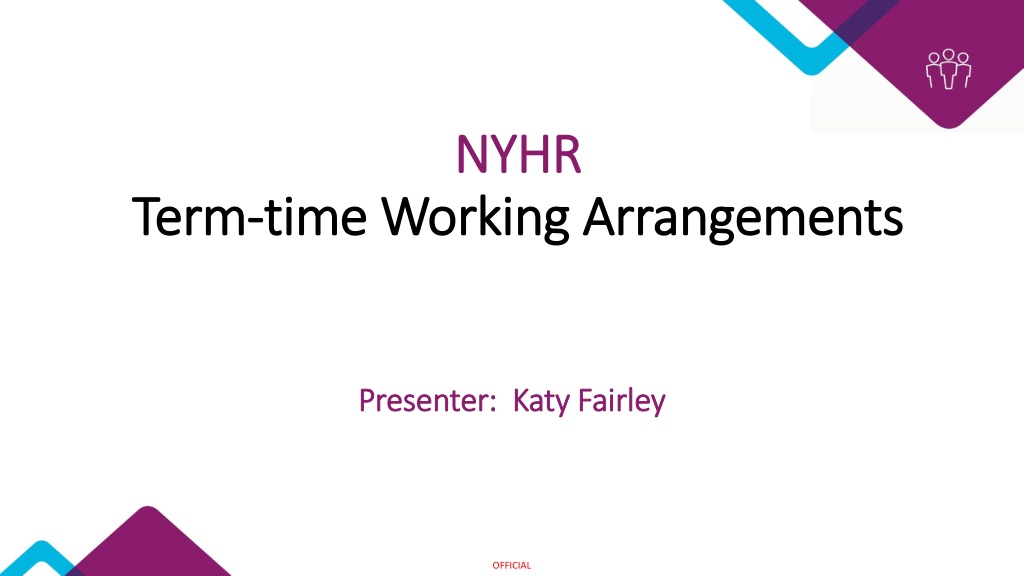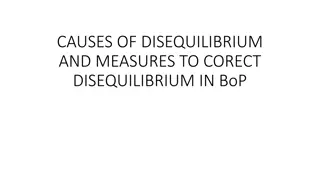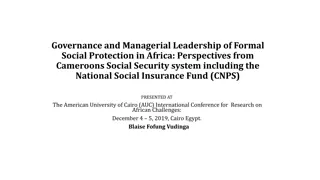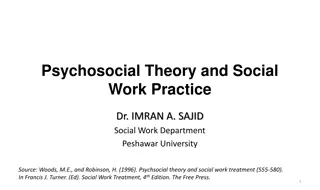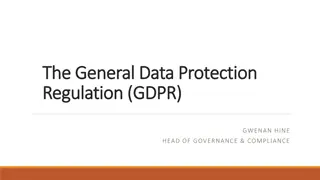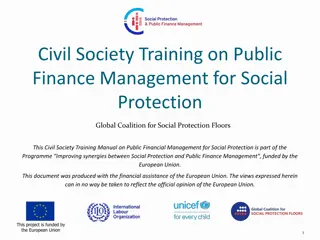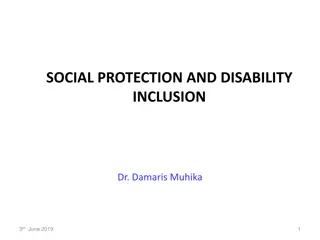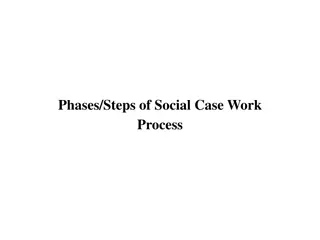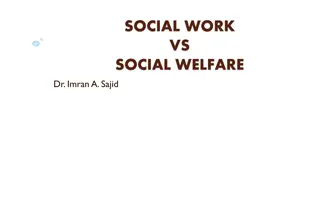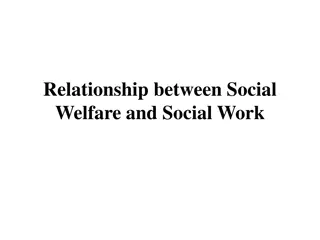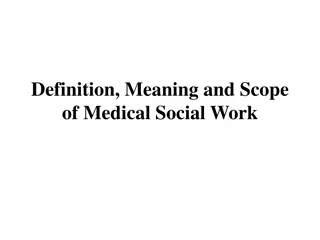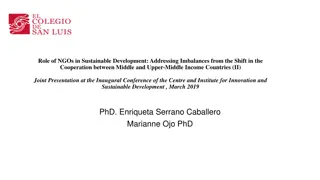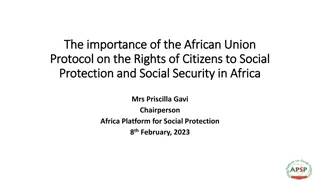Imbalances in Social Protection for New Forms of Work in the EU
The European Commission's public hearing highlights imbalances in social protection, specifically for new forms of work and atypical workers. The discussion focuses on access to social protection for workers and the self-employed in the EU, examining the context and figures related to non-standard forms of work. The presentation also delves into labor market statuses by member states and the 2019 Council Recommendation on social rights implementation.
Download Presentation

Please find below an Image/Link to download the presentation.
The content on the website is provided AS IS for your information and personal use only. It may not be sold, licensed, or shared on other websites without obtaining consent from the author. Download presentation by click this link. If you encounter any issues during the download, it is possible that the publisher has removed the file from their server.
E N D
Presentation Transcript
NYHR NYHR Term Term- -time Working Arrangements time Working Arrangements Presenter: Katy Fairley Presenter: Katy Fairley OFFICIAL
Introduction Introduction Housekeeping Please mute microphones when you are not speaking Add questions to the conversation pane Slides will be made available on CYPSInfo Key Q&As will be written up and made available on CYPSInfo We hope you find the session useful! 2 OFFICIAL
Term time working arrangements Term time working arrangements Implemented by NYCC in response to nationally agreed principles in the NJC Green Book Applies to support staff in maintained schools only from 1 April 2021 No previous documented terms and procedures Proportionate to equivalent full-year worker Main impacts: NJC advisory formula (implemented 1.4.19) Pay adjustments for mid-year starters and leavers Sickness absence Parental leave Redundancy payments (no change to current practice) 3 OFFICIAL
What is term What is term- -time working? time working? Paid 12 equal monthly amounts Reduced weeks per year Pro rata pay and leave Continuity of service 4 OFFICIAL
What is term What is term- -time working? time working? 5 OFFICIAL
What is term What is term- -time working? time working? Days worked and paid 25 20 15 10 5 0 April May June July August September October November December January February March Worked Paid 6 OFFICIAL
What is term What is term- -time working? time working? 7 OFFICIAL
What is term What is term- -time working? time working? 8 OFFICIAL
What will change? What will change? Continuing employees New employees Leavers No change Pay adjustment Pay adjustment Sickness Sickness Sickness Parental leave Parental leave Parental leave 9 OFFICIAL
Starters and leavers Starters and leavers Example 1 - Leavers Question Will a pay adjustment be required for a term-time employee leaving at end of August? Answer The employee has been paid more (42%) than the days they have worked (37%) A pay deduction of 5% will need to be made to final pay For leavers: Negative pay adjustment if pay > work (August to February) Positive pay adjustment if work > pay (April to July) 10 OFFICIAL
Starters and leavers Starters and leavers Example 2 - Starters Question What pay adjustment will be required for a term-time employee starting on 1 November? Answer The employee is due to work more (46%) than they are due to be paid (42%). A pay increase of 4% would need to be paid between November and March For starters: Negative pay adjustment if pay > work (May, June, July) Pay increase if work > pay (August to March) 11 OFFICIAL
Sickness absence Sickness absence Leave continues to accrue during periods of sickness absence Need to consider two things: Number of days leave Amount of holiday pay For a TTO worker, a day of school closure is not always a day s paid leave 12 OFFICIAL
Sickness absence Sickness absence Number of days leave School closure periods outside absence period A term-time employee is absent from 1 October to 28 February. They work 39 weeks per year and are paid 45 weeks per year. Have they had enough days leave for the year? Yes. The employee is entitled to 6 weeks paid leave per year (45 39). There are sufficient school closure periods outside the absence period for all leave to be taken i.e. Easter x 2, May half-term, summer x 6 = 9 weeks 13 OFFICIAL
Sickness absence Sickness absence Amount of holiday pay Holiday pay is paid evenly throughout the year 12 payments Less than full pay = all holiday pay not paid e.g. pay, SSP and no pay A term-time employee is absent from 1 October to 28 February. They work 39 weeks per year and are paid 45 weeks per year. They remain in full pay for the whole absence. Have they had their holiday pay for the year? Yes. As they have not be paid at less than full pay they have received their holiday pay for the year. 14 OFFICIAL
Sickness absence Sickness absence A term-time employee is absent from 1 May to 31 January. They work 39 weeks per year and are paid 45 weeks per year. They receive 6 months full pay and 3 months half pay. Have they had their leave and holiday pay for the year? First consider days leave The employee is entitled to 6 weeks paid leave per year (45 39). There are three weeks school closure periods outside the absence period i.e. Easter x 1 (before absence started), February half-term and Easter x 1 (after absence ended). Therefore, the employee is unable to take 3 weeks leave (6 3) during school closure periods. 15 OFFICIAL
Sickness absence Sickness absence A term-time employee is absent from 1 May to 31 January. They work 39 weeks per year and are paid 45 weeks per year. They receive 6 months full pay and 3 months half pay. Have they had their leave and holiday pay for the year? Next consider holiday pay The employee has not received their full entitlement to holiday pay as they had a period of half pay. Proportion of holiday pay received = 9 months full pay + 3 months half pay = 9 + (3 x 0.5) = 0.875 or 87.5% 12 Holiday pay not received = 12.5% = 0.75 weeks or 3.75 days 16 OFFICIAL
Sickness absence Sickness absence A term-time employee is absent from 1 May to 31 January. They work 39 weeks per year and are paid 45 weeks per year. They receive 6 months full pay and 3 months half pay. Have they had their leave and holiday pay for the year? Leave not taken = 3 weeks/15 days Holiday pay not received = 3.75 days Options: Allow additional leave days to be taken during term-time (either with or without pay) Allow carry forward to be taken in school closure periods in next leave year (additional payment for 3.75 days will still need to be made) Allow a combination of both e.g. 3.75 days taken during term time then 11.25 days carried forward to be taken during future school closure period Use outstanding leave as part of phased return 17 OFFICIAL
Sickness absence Sickness absence Additional issues Additional issues Sickness absence over end of leave year only statutory 20 days carried forward Termination following long-term sickness absence effect of full notice pay 18 OFFICIAL
Parental leave Parental leave Leave continues to accrue during periods of parental leave Maternity, adoption, shared parental leave Must be allowed to take leave outside parental leave period Plan prior to commencement of leave Again we need to consider two things: Number of days leave Amount of holiday pay 19 OFFICIAL
Parental leave Parental leave Full year employee who takes maternity leave from 1 April to 31 March. Their total leave entitlement is 35 days/7 weeks (27 days plus 8 bank holidays). During the year on their return they can take 14 weeks leave: 7 weeks from maternity period 7 weeks from current leave year 20 OFFICIAL
Parental leave Parental leave Term-time only employee who takes maternity leave from 1 April to 31 March. Their total leave entitlement is 6 weeks (work 39 weeks paid 45 weeks). During the year on their return they can take 12 weeks leave: 6 weeks from maternity period 6 weeks from current leave year We need to consider two things: Number of days leave Amount of holiday pay 21 OFFICIAL
Parental leave Parental leave Number of days leave 12 weeks can be accommodated in school closure period during following leave year Or an additional 6 weeks paid leave can be given during term-time Amount of holiday pay During the maternity period the employee was on reduced or no pay for the full period Have not received any holiday pay for the maternity leave period Pay adjustment required either: 6 weeks pay if taken during school closure periods, or 6 weeks paid leave given during term-time 22 OFFICIAL
Parental leave Parental leave Practical considerations: Parental leave can straddle 2 leave years leave should be proportionate to each Parental leave dates often coincide with start of closure periods Employee may wish to substitute periods of unpaid parental leave with paid leave i.e. from week 40 onwards (remember maternity cannot recommence when ended) Discuss leave arrangements with employee when planning their parental leave 23 OFFICIAL
Term time working arrangements Term time working arrangements Redundancy The effect of term-time working is removed. A TTO employee and a full-year employee with same age, service and FTE salary will receive same the redundancy payment. 24 OFFICIAL
Actions for schools Actions for schools Communicate the changes to affected employees Current employee FAQ document Communicate the arrangements to new term-time employees Include information on term-time working in recruitment documentation e.g. advert, application packs, etc. Include term-time pay figures in offer letters Share new employee FAQ document Consider where employee have been absent whether holiday pay and leave has been accounted for 25 OFFICIAL
Further information Further information Available on CYPSInfo: Implementing term-time working arrangements - Actions for schools FAQs for current employees FAQs for new employees NYCC Term-time Working Arrangements April 2021 Contact NYHR@northyorks.gov.uk or 01609 798343 Questions? 26 OFFICIAL
